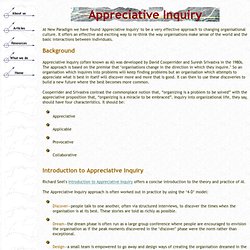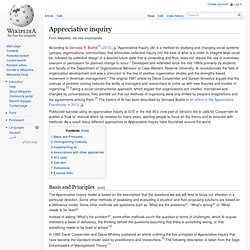

The Taos Institute. The Appreciative Inquiry Commons. Appreciative Inquiry. What is Appreciative Inquiry?

By Joe Hall and Sue Hammond also offers a reasonably brief and readable introduction to the principles and practice of AI. Richard Seel: "We use AI principles quite a lot in our work – for instance, when a team I was working with suddenly had the plug pulled on their project they were very angry and depressed. I encouraged them to undertake a brief appreciative inquiry into the times when they had worked really well as a team. A fresh way of looking at organizations and philanthropy. Australian Appreciative Inquiry home page. International jornal of Appreciative Inquiry. Appreciative Inquiry and Community Development. Appreciative inquiry. According to Gervase R.

Bushe[1] (2013) "Appreciative Inquiry (AI) is a method for studying and changing social systems (groups, organizations, communities) that advocates collective inquiry into the best of what is in order to imagine what could be, followed by collective design of a desired future state that is compelling and thus, does not require the use of incentives, coercion or persuasion for planned change to occur. " Developed and extended since the mid 1980s primarily by students and faculty of the Department of Organizational Behavior at Case Western Reserve University, AI revolutionized the field of organization development and was a precursor to the rise of positive organization studies and the strengths based movement in American management.
" Basis and Principles[edit]